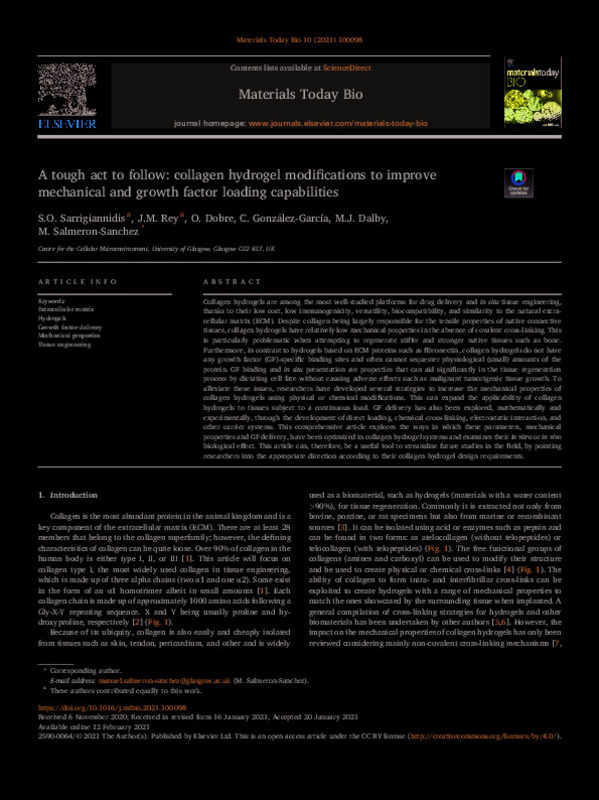JavaScript is disabled for your browser. Some features of this site may not work without it.
Buscar en RiuNet
Listar
Mi cuenta
Estadísticas
Ayuda RiuNet
Admin. UPV
A tough act to follow: collagen hydrogel modifications to improve mechanical and growth factor loading capabilities
Mostrar el registro sencillo del ítem
Ficheros en el ítem
| dc.contributor.author | Sarrigiannidis, S.O.
|
es_ES |
| dc.contributor.author | Rey, J. M.
|
es_ES |
| dc.contributor.author | Dobre, O .
|
es_ES |
| dc.contributor.author | González-García, C.
|
es_ES |
| dc.contributor.author | Dalby, M.J.
|
es_ES |
| dc.contributor.author | Salmerón Sánchez, Manuel
|
es_ES |
| dc.date.accessioned | 2022-11-10T19:02:18Z | |
| dc.date.available | 2022-11-10T19:02:18Z | |
| dc.date.issued | 2021-03 | es_ES |
| dc.identifier.uri | http://hdl.handle.net/10251/189588 | |
| dc.description.abstract | [EN] Collagen hydrogels are among the most well-studied platforms for drug delivery and in situ tissue engineering, thanks to their low cost, low immunogenicity, versatility, biocompatibility, and similarity to the natural extracellular matrix (ECM). Despite collagen being largely responsible for the tensile properties of native connective tissues, collagen hydrogels have relatively low mechanical properties in the absence of covalent cross-linking. This is particularly problematic when attempting to regenerate stiffer and stronger native tissues such as bone. Furthermore, in contrast to hydrogels based on ECM proteins such as fibronectin, collagen hydrogels do not have any growth factor (GF)-specific binding sites and often cannot sequester physiological (small) amounts of the protein. GF binding and in situ presentation are properties that can aid significantly in the tissue regeneration process by dictating cell fate without causing adverse effects such as malignant tumorigenic tissue growth. To alleviate these issues, researchers have developed several strategies to increase the mechanical properties of collagen hydrogels using physical or chemical modifications. This can expand the applicability of collagen hydrogels to tissues subject to a continuous load. GF delivery has also been explored, mathematically and experimentally, through the development of direct loading, chemical cross-linking, electrostatic interaction, and other carrier systems. This comprehensive article explores the ways in which these parameters, mechanical properties and GF delivery, have been optimized in collagen hydrogel systems and examines their in vitro or in vivo biological effect. This article can, therefore, be a useful tool to streamline future studies in the field, by pointing researchers into the appropriate direction according to their collagen hydrogel design requirements. | es_ES |
| dc.description.sponsorship | This work was supported by Medical Research Scotland, EPSRC (through a programme grant EP/P001114/1) and a programme of research funded by the Sir Bobby Charlton Foundation. M.S.S. acknowledges support from a grant from the UK Regenerative Medicine Platform 'Acellular/Smart Materials - 3D Architecture' (MR/R015651/1). The graphical abstract was created using BioRender.com. | es_ES |
| dc.language | Inglés | es_ES |
| dc.publisher | Elsevier | es_ES |
| dc.relation.ispartof | Materials Today Bio | es_ES |
| dc.rights | Reconocimiento (by) | es_ES |
| dc.subject | Extracellular matrix | es_ES |
| dc.subject | Hydrogels | es_ES |
| dc.subject | Growth factor delivery | es_ES |
| dc.subject | Mechanical properties | es_ES |
| dc.subject | Tissue engineering | es_ES |
| dc.subject.classification | FISICA APLICADA | es_ES |
| dc.title | A tough act to follow: collagen hydrogel modifications to improve mechanical and growth factor loading capabilities | es_ES |
| dc.type | Artículo | es_ES |
| dc.identifier.doi | 10.1016/j.mtbio.2021.100098 | es_ES |
| dc.relation.projectID | info:eu-repo/grantAgreement/EPSRC//EP%2FP001114%2F1/ | es_ES |
| dc.relation.projectID | info:eu-repo/grantAgreement/UKRMP//MR%2FR015651%2F1/ | es_ES |
| dc.rights.accessRights | Abierto | es_ES |
| dc.contributor.affiliation | Universitat Politècnica de València. Escuela Técnica Superior de Ingenieros Industriales - Escola Tècnica Superior d'Enginyers Industrials | es_ES |
| dc.description.bibliographicCitation | Sarrigiannidis, S.; Rey, JM.; Dobre, O..; González-García, C.; Dalby, M.; Salmerón Sánchez, M. (2021). A tough act to follow: collagen hydrogel modifications to improve mechanical and growth factor loading capabilities. Materials Today Bio. 10(1):1-22. https://doi.org/10.1016/j.mtbio.2021.100098 | es_ES |
| dc.description.accrualMethod | S | es_ES |
| dc.relation.publisherversion | https://doi.org/10.1016/j.mtbio.2021.100098 | es_ES |
| dc.description.upvformatpinicio | 1 | es_ES |
| dc.description.upvformatpfin | 22 | es_ES |
| dc.type.version | info:eu-repo/semantics/publishedVersion | es_ES |
| dc.description.volume | 10 | es_ES |
| dc.description.issue | 1 | es_ES |
| dc.identifier.eissn | 2590-0064 | es_ES |
| dc.relation.pasarela | S\463744 | es_ES |
| dc.contributor.funder | UK Regenerative Medicine Platform | es_ES |
| dc.contributor.funder | Engineering and Physical Sciences Research Council, Reino Unido | es_ES |








